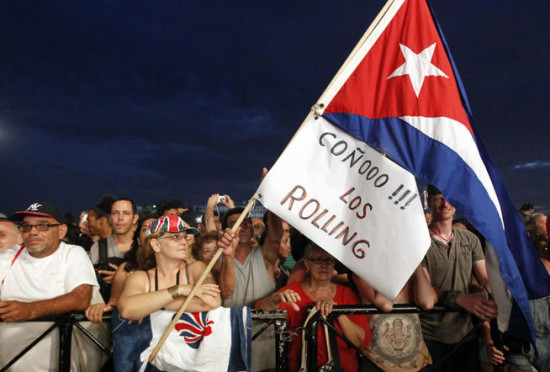
Coño, indeed.
Now that all the dust has settled after the Stones oh-so-historically played in Havana, it’s time to start asking some hard questions about their “free” concert. After all, Mick Jagger is a notorious greedyguts; he’s even been known to stiff the ladies of paid company when purchasing their services. It’s hard to imagine him doing anything out of the goodness of his little puny heart, which makes the Grinch’s pre-epiphany ticker look downright gargantuan. There’s about as much goodness in a dried-up dog turd. So, let’s follow the money with El Confidencial:
The “who”, “when” and “where” have been the centre of attention for weeks. The Rolling Stones would perform at the Ciudad Deportiva de La Habana on March 25 before an audience of an estimated half-million spectators. Those are the facts which the news agencies have been replicating politely since the news came out on February 29. Also the “how”: It will be a free open-air megaconcert. But this time the dimensions of this “how” go far beyond the set list (from “Jumpin’ Jack Flash” to “Brown Sugar” through “It’s Only Rock ‘n’ Roll”, “Paint It Black”, “Sympathy for the Devil”…) and we really have to bring ourselves to ask the real “why” of the Cuban concert.
Regarding such an exceptional event, the question is not whether they played “(I Can’t Get No) Satisfaction” or not. Yes, there was something missing. When it comes to the Rolling Stones’ visit to Cuba, the essential question is: Who paid for all this?
The Cuban government would not pay for such astronomical cachet as that of the Stones, even if it were in a position to do so, cost it what it might. Come on, Cuba isn’t like the Deutsche Bank, which is able to put up four million euros, as it did in 2007 so that the Jagger/Richards band would play for 600 of their most select clients in the Museu Nacional d’Art de Catalunya. The Rolling Stones don’t leave their homes if there isn’t lots and lots of money on the table. And the estimated cost of the Havana concert was about $7 million. So…
According to Billboard magazine, neither the Stones nor AEG, the company that runs their tours, would make any money off the Havana concert. However, the same source speaks of a stage requiring 61 shipboard containers, a Boeing 747, and 350 persons to transport it. The promoters babbled on and on about the concert as “an historic embrace between the Cuban people and the international musical community”, but the truth is that the Stones staged absolutely everything. Cuba brought the public and the applause.
Behind this monumental display is the Fundashon Bon Intenshon. No, that’s not a Sacha Baron Cohen joke, but a charitable foundation which also sponsors a soccer team for disadvantaged kids from an orphanage, or puts on a jazz festival with Sting, Rubén Blades, Chic, Stevie Wonder, Juan Luis Guerra, Alicia Keys, and whoever else. Based on the island of Curaçao, one of the former Dutch Antilles, the FBI (those are its initials!) is a philanthropic project of Gregory Elias, whose charitable works are principally located on the island itself.
At the same time, Elias is president of United Trust, one of the leading financial advisor firms of that Caribbean fiscal paradise. United Trust presents itself to the world of high and labyrinthine finance via this declaration: “We are proud of our ability to follow the laws which regulate some of the most challenging financial situations in all the world.” And then they clarify: “In fact, the people of United have helped to shape the law which regulate the financial services sector.” It’s a subtle way of suggesting to their clients that they know how to adjust themselves to legality, given that they have contributed to designing it. The Antillean business makes a big show of transparency, but what it won’t reveal in the web is the names of its clients.
The United Trust website is a model of transparency in other senses. For example, it helps to give an idea of the concerns and needs of those it represents. In the article “Towards unity in the superyacht sector”, it asks “how to unite the superyacht sector to create a situation with greater equality of opportunity in the most competitive way.” That’s not what 99% of people are asking in actual reality, but the Cuban coast is one of the most coveted treasures for foreign investors. Cuba would be an ideal port of call for cruise lines, and for harborage of private yachts. Just the Punta Colorada Complex, planned for the province of Pinar del Río, will have port facilities for 1400 megayachts. And while Pope Francis, Obama and the Stones were promoting their respective visits to Cuba, US finance experts were publishing articles such as “Four ways to invest in Cuba right now”, “Five things you should know about buying properties in Cuba”, “25 things every investor should know before settling in Cuba”, “Seven ways to invest in Cuba”…
It’s the sort of articles Mick Jagger might read over breakfast. In 1971, the Rolling Stones marked two milestones in rock history. The first was recording the double album “Exile on Main Street” in their new home in the south of France. The second was to divert their investments to elude the British exchequer. The business that made fiscal pioneers out of them was a Dutch company, Promogroup. Dutch because it was on the isle of Curaçao, which became an independent territory in 2010. Dutch like the university in which Gregory Elias studied. Dutch, while we’re at it, like the trail that helped the Tax Agency to find the 4.6 million euros which Oleguer Pujol, son of Jordi Pujol, the former president of the Generalitat, had hidden in Curaçao.
The Rolling Stones’ lyrics have been the subject of endless study in many schools, but their numbers also should be. Havana was the final stop on their Latin American tour, but the previous dates have also had their complications. There’s been talk for months of how difficult it was for the group to perform in La Plata because of the weakness of the Argentine peso. Promoter Daniel Grinbank’s response was pure rock ‘n’ roll: “We have to do some special financial engineering.” And they did.
In October 2015, Mick Jagger travelled to Cuba and in four months, the deal was sealed. At first the concert was set for Sunday, March 20, but when it became known that Barack Obama was coming to visit the island that day, the concert was postponed five days. To give it enough hype, it was announced as “the first open-air concert by a British band” on Cuban soil. That way, no one could argue against that with the Manic Street Preachers, who performed in Cuba in 2001, but in the Karl Marx Theatre. Or Audioslave, who performed in 2005 before 70,000 people in the anti-imperialist José Martí stadium. Or Major Lazer, who brought in 450,000 people on March 6, because Diplo isn’t a rock band.
The world doesn’t need any more Stones records, but their contract, with all its clauses and shares deriving from their “show” in Cuba, should fall into the hands of some university; private, “of course”. A minute analysis of the document should serve for a juicy and intense master’s thesis of two or three years: “Financial engineering, philanthrocapitalism and rock ‘n’ roll in its senior years”. And as an extra, a showing of the “historic show” of the Stones in Havana (“historic” is the most repeated adjective in the headlines), with special attention to the song selected by popular vote to bolster the set list: nothing less than “All Down the Line”, from the exiled “Exile on Main Street”.
The secret concert by the Stones nine years ago in the MNAC in Barcelona was the cherry on top of a programme of new financial products which the Deutsche Bank organized, and in which “executives of Morgan Stanley, Goldman Sachs, JP Morgan, Santander Gestión, BBVA, La Caixa and analysts from Singapore and Hong Kong” participated, according to El Economista. Now that Sir Mick Jagger’s band has become something more than a money-making machine (it’s a cultural hook around which money gets made), let’s learn about the hands that have joined, the meetings that have taken place, the treaties signed, and the percentages agreed upon while Jagger, Richards, Watts and Wood played “Gimme Shelter” in Havana.
And all thanks to the Fundashon Bon Intenshon and United Trust.
Translation mine.
So there you go. The Stones may not have taken any money for their Havana concert, but they didn’t go out of pocket to play Cuba as the not-really-first British band on the island, either. They had financial help, and lots of it, from a “charitable” foundation set up by highly influential financial interests in Curaçao. So influential, in fact, that they dictated the financial laws straight to the local government. Maybe it wasn’t the same band of thieves that helped Mick & Co. escape the British Exchequer; maybe it’s only their kissing cousins. But it says a lot about the Stones’ long-standing and very close ties to the financial underworld, does it not?
And on that note, I think a song is in order. You’ll note that it’s NOT one of theirs, because I’m not a fan and never have been. I much prefer their main rivals from back in the day:



